To give you just a few recent examples…
New vegan product a sales hit
The first example is the British bakery chain Gregg. I first heard of its existence when it released vegan sausage rolls and I read about it on overseas vegan groups on Facebook. News of the company’s expansion spread quickly and British vegans stormed the stores.
The company was not up to the challenge at first, and stores ran out of the new product. However, it quickly ramped up production and the new addition to the range more than paid for itself. This investment, among others, increased the value of the company’s shares by 13 percent.[11]
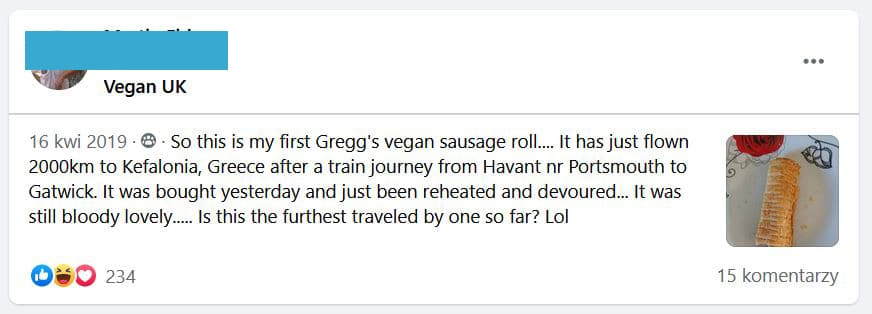
A post about sausage rolls on one foreign vegan Facebook group
Out of curiosity I checked the company’s Facebook page. The average number of likes for the brand’s posts is about 100, while the post about vegetable kabanos was liked by 3,400 people. In addition, it had 1,000 comments and almost 500 shares.
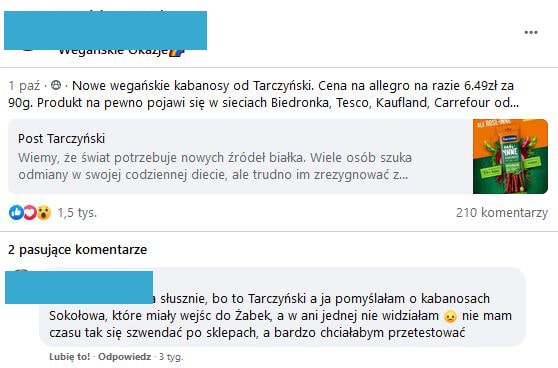
A post on one of the vegan Facebook groups about Tarczyński’s plant-based kabanos sausages. It was liked by 1,500 people. This is just one of many posts on the topic.
Vegan products conquer the stock market
In 2019, the share price of Beyond Meat, a company that produces a plant-based meat substitute, rose 718% in just three months after its IPO (return calculated from the issue price).[2]
The vegan trend can no longer be questioned. The dominant meat companies – Tyson, Smithfield, and Hormel Foods – have begun investing in plant-based meat substitutes.
Interestingly, one of the people who invested in Beyond Meat was Bill Gates.
As of June of this year, Beyond Meat’s shares were up 49 percent.[3]
Hoping to replicate success and find a “second Beyond Meat,” entrepreneurs invested 457 million dollars throughout 2019. In just the first seven months of 2020, more than $1.4 billion was invested.[4]
Meanwhile, a new cash cow has appeared on the horizon. Or perhaps it would be more accurate to write: a cash hen.
The egg substitute market is estimated to exceed $1.1 billion by 2023.[5] According to research center SPINS, the size of the egg substitute market nearly tripled in 2019 compared to 2018.[6]
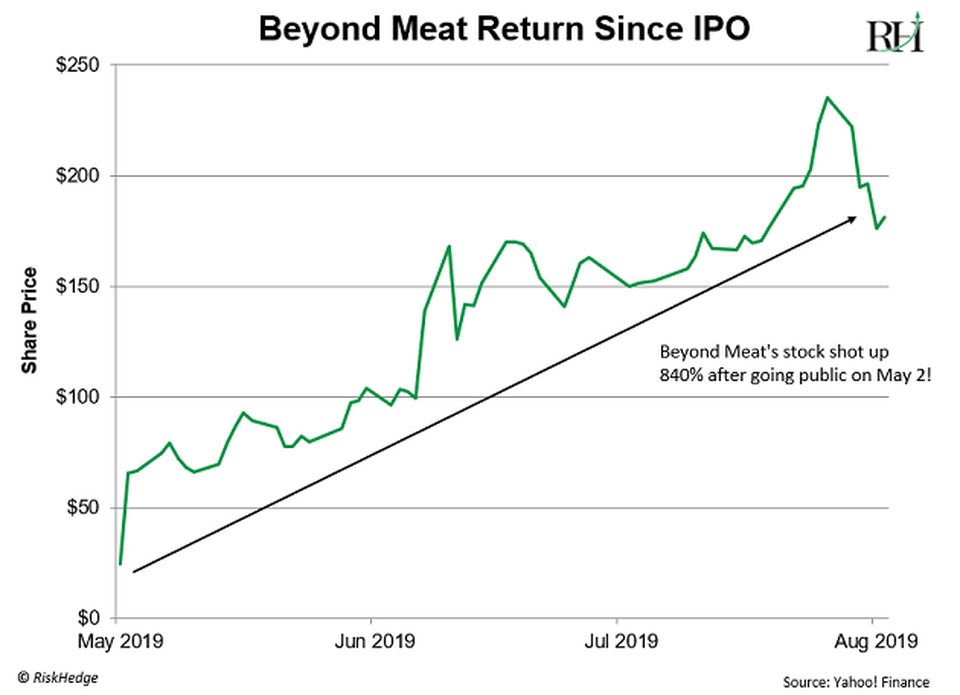
Since Beyond Meat went public in May 2019, the company’s stock has skyrocketed. Source: Yahoo! Finance
Beyond Meat video explainer on product benefits.
-
Why do companies like Bahlsen, Hochland and Herbalife choose our animation studio?
-
How we can help you reach your goals?
Target group
Some say you advertise vegan products like any other product and others say it’s a completely new type of product, and you have to go beyond the usual marketing thinking.
And both are partly right.
– In my opinion, many of the principles of skillful marketing of plant-based products overlap with generally accepted best practices in the advertising industry. From my perspective, consistency, authenticity, and a clear message are key. On the other hand, my attention has recently been drawn to the rather chaotic, point-by-point approach to the communication of new plant-based products implemented by companies that undertake such activities for the first time – at the same time I can fully understand these difficulties, after all, for many brands it is a confrontation with new categories, consumers, and often also the turning of existing marketing activities almost upside down – says Maciej Otrębski from RoślinnieJemy campaign.
We have two groups of consumers.
One is vegetarians and vegans who are up-to-date with plant-based news. They want a clear message that the product is vegan. Hence the popularity of certificates.
The second group is the consumers we want to convince to try a new product. They are less open to it at the beginning than vegans. They need to understand the product, know what properties it has and why it is worth diversifying their diet.
Although there are more and more vegans, the latter group of consumers shapes the market.
– I think that people who limit their intake of meat and animal products are the main drivers of change. Market research shows that vegan products are mostly eaten by non-vegans, omnivores who limit certain ingredients in their diet. They are the ones creating the demand. Companies are responding to the demand: ‘ok, let’s create something really tasty because this product is finally starting to generate revenue’. Flexitarians are the ones who make it profitable for companies and restaurants to launch vegan products and vegan businesses. Thanks to them, it will also become easier and easier to convert to veganism in the future – says Tobias Leenaert, co-founder of the organization ProVeg, trainer of the organization CEVA, and author of the book How to Create a Vegan World.[14]
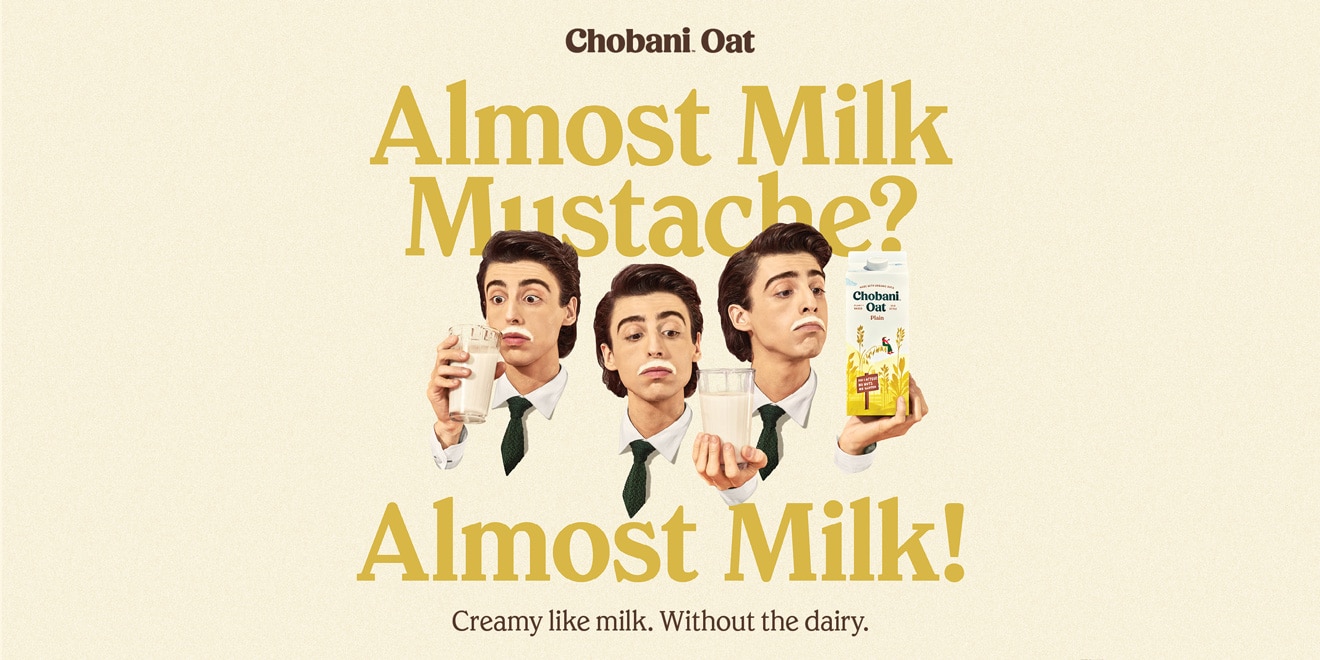
An advertisement for a plant-based beverage from the company Chobani Oat. “Almost dairy mustaches? Almost milk! Creamy like milk. But without the dairy.”
Plant-based or vegan?
Over the past two years, many businesses have introduced plant-based options, including IKEA, Subway or McDonalds.
What is interesting though is how they name their products. It is hard to find names like:
“Hot dog for vegans and vegetarians”, “meatless burger”, “vegan meatballs”…
In advertising, every word matters, and it turns out that the word “veganism” has a deterrent effect for some people, according to a report from the World Resource Institute.
The Institute conducted a study of coffee shop chains in the UK and identified four types of language that the food industry should not use and three that it should use to attract consumers and increase the sale of plant-based products.
The four words/phrases to avoid:
- “meatless” – can be perceived negatively by carnivores. In the report it reads: “This is because emphasizing what a dish is missing can make people want to avoid missing something”;
- “vegan” – people feel excluded and think that this product is not for them;
- “vegetarian” – as in “vegan”;
- “low-fat” – and generally language that focuses on negative health aspects.[15]
– Health doesn’t sell. People don’t want to eat products labeled as good for them. If you have a delicious roasted zucchini with mint and feta cheese, don’t focus on talking about how good that zucchini is for someone’s health – says Erica Holland-Toll of Stanford University’s Flavor Lab.[16]
On the three aspects to focus on:
- origin – for example, Los Angeles-based Panera Bread changed the name of its soup from “low-fat vegetarian black bean soup” to “Cuban black bean soup,” which resulted in a 13 percent increase in its sales;
- flavor – adjectives that describe how a dish tastes… i.e. not “nutritious bean soup” but rather “flavorful bean soup”;
- appearance and texture – these are descriptions of the appearance of the food, including color. Moreover, we can read in the report that “phrases such as ‘melt-in-your-mouth’ are associated with high-fat food and are perceived positively by many customers, so it may help convince them that vegan food is not boring, bland or unpalatable.”[15]
Examples of several descriptions constructed according to these principles:
- “Japanese-style tofu cutlets” – the name of the product on Typhoon’s packaging;
- “Vegan sausages in flavorful curry sauce is a quick and easy dish to prepare,” product description by Peta Zwei.
- “Vegetable Ribs are juicy, flavorful and melt in your mouth.” – description of meatless ribs from the company Meatless Meat.
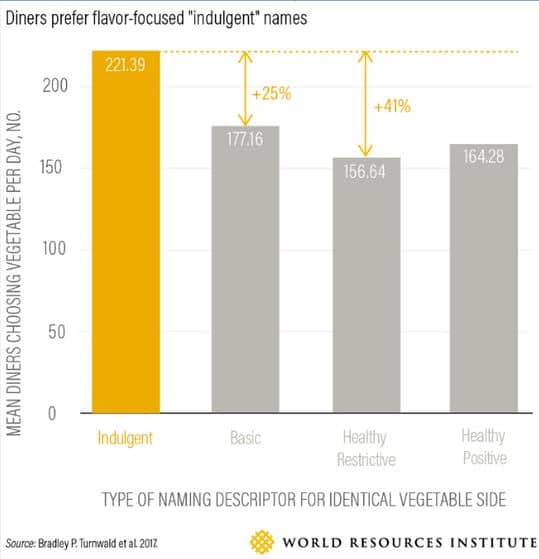
According to a World Resources Institute study, people prefer product names that address satisfying the palate more than health arguments.
Words on a censored list
While we’re on the subject of naming of products, we can’t help but think of the bill to ban the use of words like “burger,” “schnitzel” and “sausage” for products that don’t contain meat.
In 2019, European Parliament’s Committee on Agriculture and Rural Development (AGRI) expressed concern that they could mislead consumers.[17]
Such provisions in the law are nothing new. In 2017, European Union banned names associated with dairy in the naming of plant products. Therefore, although plant-based milk or butter are commonly talked about, you won’t find them under these names in stores. One must look for vegan drinks or spreads.[18]
According to the manufacturers of these products and pro-vegan organizations, such provisions are bizarre. It is not illegal to use the word “butter” for peanut butter or “milk” for coconut milk. They believe this is a result of the popularization of plant-based products, which greatly concerns the meat industry, who are lobbying for such changes in the law.
“Vegetarian disk?” “Vegan roller?” That’s what the labels of plant-based meat alternatives could soon look like. But in late October of 2020, the European Union rejected the proposal.[19]

Advertisement for vegan meat substitute Impossible Meat. “Meat made from plants. Wow.”
The Swedish company Oatly, which is currently conquering global markets, is well aware of this. In an attempt to popularize plant-based drinks in China, it created a new word and sign for “new milk”. [20]
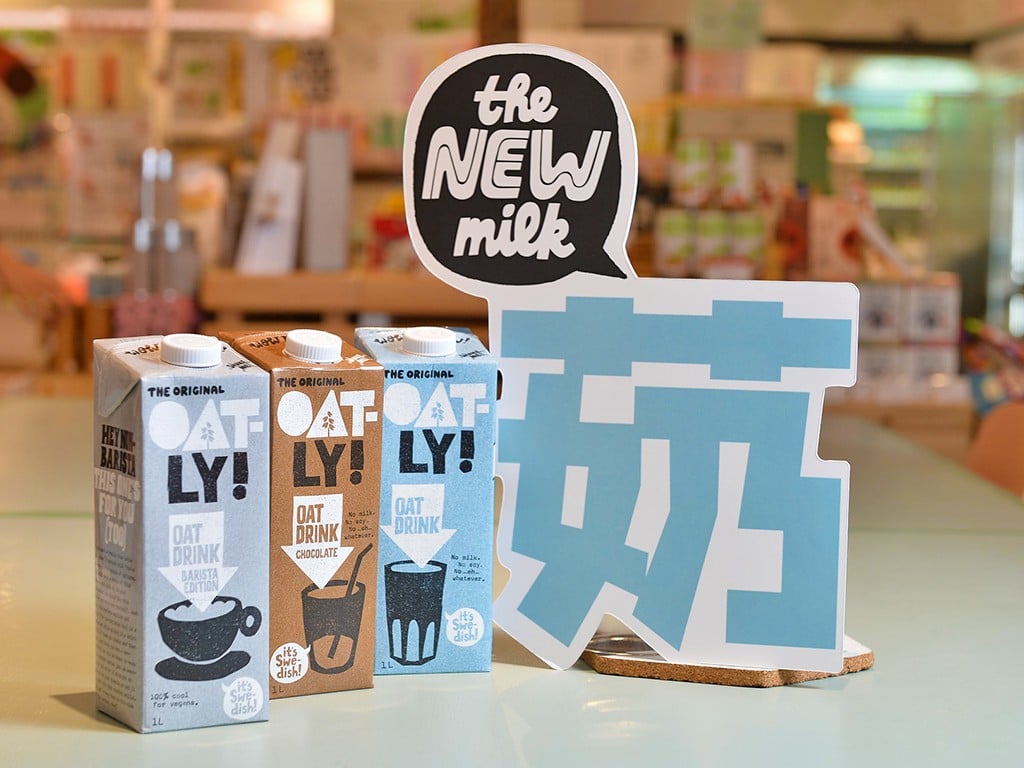
“New milk” word and sign created for plant-based beverages as part of an advertising campaign in China.
Blunt or subtle?
Most vegan producers and venues don’t bother with elaborate company names. Most of them use the word “veg” in various configurations – Vege Kiosk, Vege Kitchen, Vega, Vege Pizza.
All of the “veg” headings immediately profile the place or product. This has its pros and cons – some will be encouraged to try it, and others will turn their backs as soon as they see a restaurant signboard or a logo on the package with the word “veg”.
There are many original names on the market too, such as Field Roast, Tofurky and Meatless Meat.
There are some companies whose name does not reveals what cuisine or product line they specialize in. The advantage of this is that “casual” customers may also find their way to them.
One time while I was waiting in line at Loving Hut, a vegan Asian cuisine restaurant, two men in front of me were debating whether it was better to get shrimp or spring rolls. When it came to placing their order, they were shocked that the items they chose were 100 percent plant-based. However, they did not leave, and from what I managed to hear, they quite enjoyed it. If the place had a signboard, such as “Vegan Feast” , I doubt they would have given it a chance.
Marketing vegan products is marketing innovation
Vegan products are a bit like the first smartphones for the mass non-vegan consumer. It’s not really clear “what it’s for”. So it’s hard to expect that when such people see a product in a store, they will immediately reach for it.
There are also a lot of harmful myths surrounding vegan products, such as that they are tasteless, that soy is bad for men, and that they don’t have enough protein. Each myth is a barrier that stands between a new customer and a purchase. That’s why many companies address or debunk the myths so that more people are willing to try plant-based options.
Consumers want to know:
- What is the product made of?
- How was it created?
- Why was it created in this way? What does it provide?
- How can they use it?
Therefore, such audiences must first be educated.
In fact, this is how Apple worked in the days of the first smartphones.
In the first Apple ads there were no close-ups of the iPhone or lofty slogans.
The advertising was focused on showing specific applications of the device, because the average Joe did not know what he could do with a smartphone. So he did not feel any motivation to purchase an iPhone.
A similar move could pay off for veganism. A survey conducted by Pyszne.pl shows that there are 1 million vegans and vegetarians in Poland, and 2 million people are considering a meatless way of eating.[21]
The familiar taste of meat
So, should we compare vegan products to their meat substitutes or the taste of meat or is it better to avoid it?
It depends on which group you are focused on. Some vegans reject animal products for ethical reasons, not taste, so if they get the message that a dish tastes like meat but no animals were killed during its production, they are willing to buy it.
Specific products and dishes or the way they are served often evoke memories that are familiar and people like to return to them.
Some people associate “pork chop” with a Sunday home dinner, and “grilled sausage” with a trip to the allotment with friends. So if a manufacturer offers flavors that evoke such memories, customers will likely reach for them.
Another side of this issue is that the comparison can be perceived as proof that the taste of meat is the ideal that the manufacturer is striving for. “So why reach for the fake?”, a potential customer may think.
That’s why companies adopt different strategies. Some explicitly appeal to flavors already familiar to people. Impossible Burger even boasts that it “bleeds” like real meat.[22] Other companies prefer to emphasize the distinctiveness or unique qualities of their product.
Ethics are at a premium
While some companies avoid as much as possible wording relating to a vegan diet, others go head-to-head with the topic. And, contrary to the research cited above, they’re doing just fine.
The first example: an ad for vegan chocolate made by Katjes. It was shown in German TV.
It features drawings by Gerald Scarfe, who also drew Pink Floyd’s The Wall.
-
Why do companies like Bahlsen, Hochland and Herbalife choose our animation studio?
-
How we can help you reach your goals?
The company puts a lot of emphasis on ethical considerations in the commercial.
Why does this advertisement work?
I think it is a matter of consumers’ readiness for such a message. A lot vegans who chose this diet due to ethical reasons will share it in social media because of its strong message.
This also shows that as customers become more accustomed to veganism brands will be able to be bolder in their messaging.
– It made quite an impression and we saw an increase in interest in all our products. Obviously we’re excited, the campaign created such demand for Oatly products that we far exceeded our expected sales goals – said Mike Messersmith, general manager of Oatly.[23]
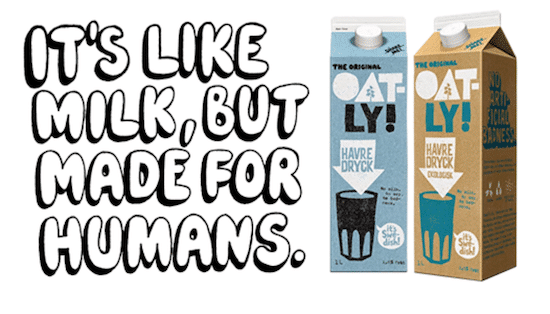
The power of association
Some companies deliberately compare their products to their non-vegan counterparts. Statements are made such as: familiar form, but better taste; great taste, but without animal suffering; and healthier version, better quality.
An interesting example is the Alpro Soya brand campaign. The advertising of plant-based drinks and yogurts refers to the well-known advertising slogan “drink milk, you will be great”. On the brand ads we read: “You are great”.
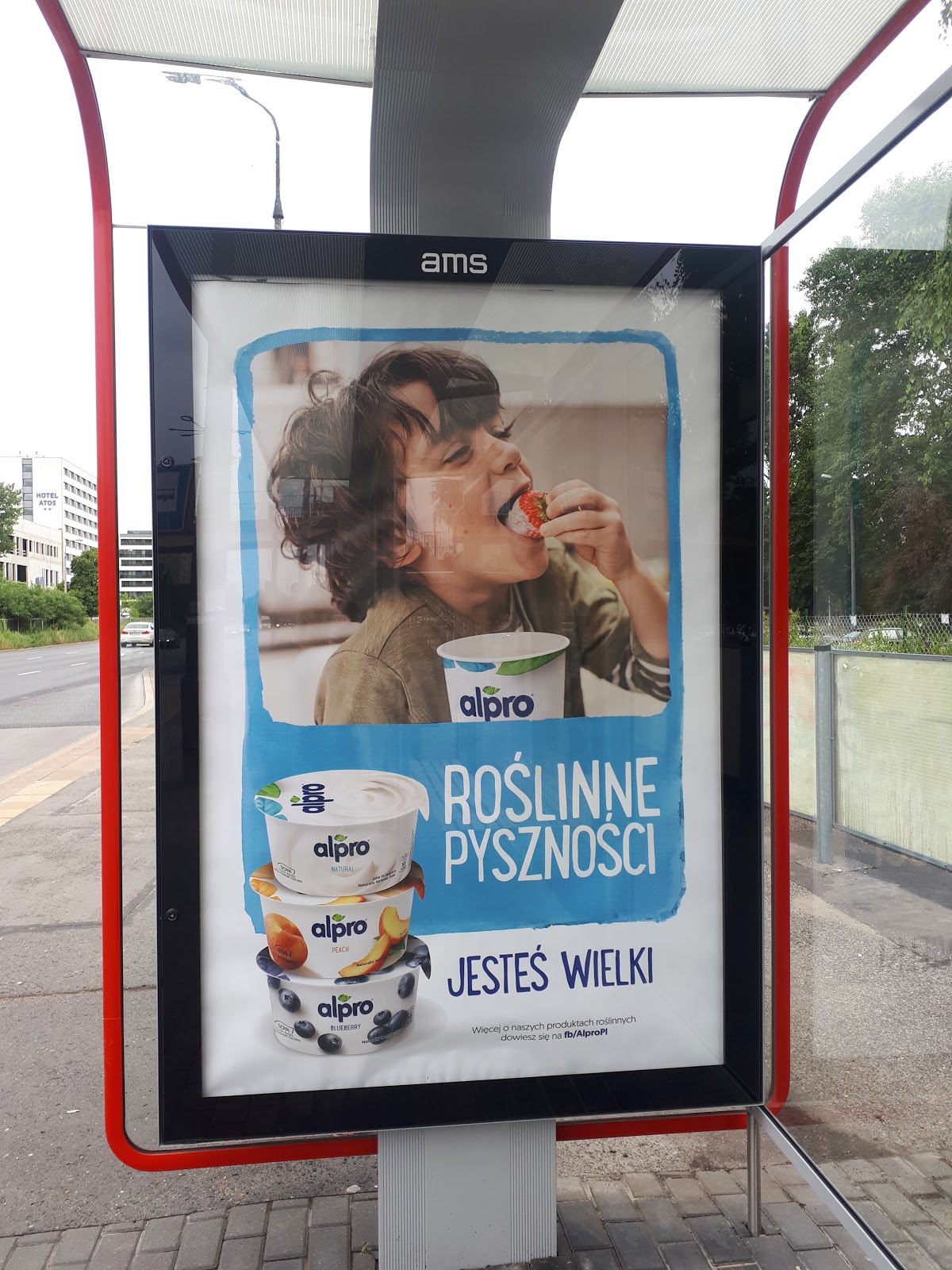
The company remained unmoved by the requests of the then not so large group of consumers.
Today, its yogurts can be found in most major retail chains.
Dialogue with meat eaters
As the example of Oatly shows, controversy sells.
KFC knows a thing or two about it! When it released a vegan “chicken” sandwich in Canada in late 2019, it relied on creative marketing.[24]
Remember, this is a company that built an empire on selling chicken. For many, the words “veganism” and “KFC” do not go together. This is what the authors of the advertising campaign referred to.
In the brand’s spot, a voiceover states: “Everyone will love plant-based KFC. Except Bobby, who writes: [How dare you. Don’t do it]. Chill out Bobby. They’re just plant-based substitutes.”
Shelf placement in stores
The place for vegan products is in … well, exactly where?
– We made a rule that if a chain didn’t want to put us in the meat department, we weren’t going to sell to them at all – said Ethan Brown, founder of Beyond Meat.
It was 2012 and at the time, it was out of the question for vegan products to be sold alongside meat products. It wasn’t until Whole Foods in the Rocky Mountains in the U.S. agreed to do this that the company opened the floodgates to more stores.[25]
It could be said that Beyond Meat paved the path for vegan products from health food shelves to meat and dairy departments.
– Thanks to the fact that we stood in the company of meat, we reached a completely new audience, and these are customers who would never in their lives approach a shelf with hummus. These are just people who went to Lidl or Kaufland to buy a sausage for the barbecue, and their hand probably trembled and they took those meatballs or a burger. We started to get very nice feedback from people who had never had contact with plant-based products before – said Karolina Kubara (Dobra Kaloria) at the 2019 Plant-Powered Perspectives conference.[26]
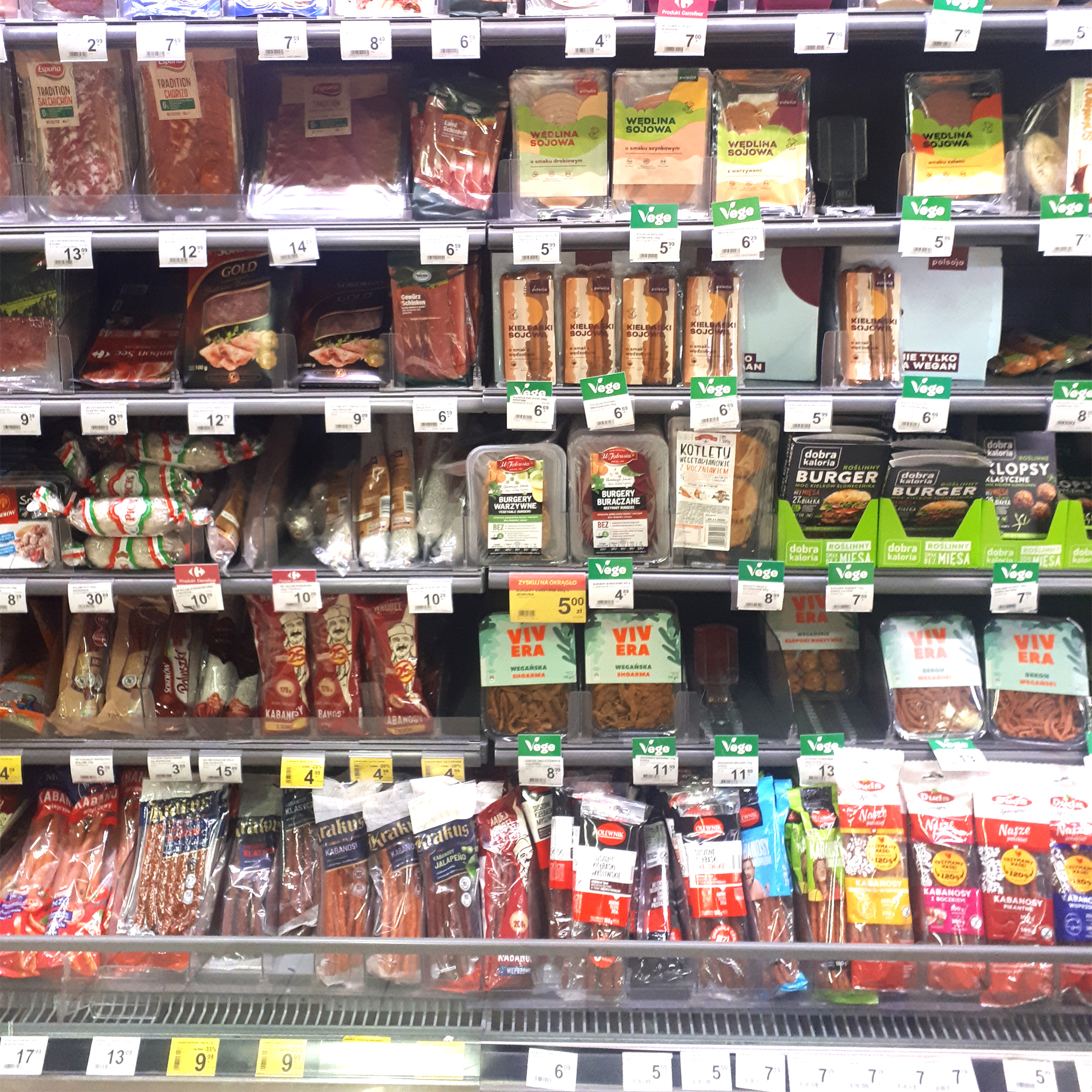
A meat section in a supermarket with vegan meat substitutes
Trends
What does the future hold? Certainly even more plant-based products.
The vegan food market is estimated to reach $31.4 billion by 2026, with a CAGR (compound annual growth rate) of 10.5 percent compared to 2019.[27]
– Retail chains are actively looking for new vegan products. They want them on their shelves. It used to be that you would go to a merchant and the merchant would say: “people don’t know it, small margin, it’s some kind of novelty, I’ll just take some”. Today the merchant says: “give us more, do you have any interesting projects? what will appear in six months, what in a year?”. Now we’re accelerating a team developing a brand of bean-based vegan yogurt, Cool Beans. The girls have actually only shown the product at the Plant-Powered Perspectives conference this year, and people are already reaching out to us with questions about it,” says Piotr Grabowski.
More vegan products means more competition, and therefore higher consumer expectations.
– In 2020, two important trends emerged that were impossible to ignore if the market wants to maintain or increase its growth rate. It will be a big challenge for food manufacturers as products will need to be healthier and healthier, and new formulas will need to be tested, because that’s what consumers want. The second issue is that the market for vegan products will become more “subtle”. There will be a more positive message about plant-based foods as the vege trend is not just for vegans, it is primarily about reducing meat consumption. Already half of UK consumers say they are doing this – says Edward Bergen, Global Food & Drink Analyst.[28]
This is also confirmed by organizations dedicated to promoting a plant-based diet. When asked “what collaboration has surprised you the most?”, Przemyslaw Chojnicki replied:
– We are no longer surprised by cosmetics, clothing or furniture. However, there are sometimes seemingly very exotic applications. One example is the certification of firefighter helmets, which we dealt with last year. This shows how much demand we are starting to see in the world for vegan products.
Educating the market about vege products with ExplainVisually
On the one hand, we want to reach vegans and vegetarians, and on the other hand, we want to reach other consumer groups. These people need to be educated about plant-based products and vege food processing techniques.
I don’t want this to sound directly like an advertisement, because I really believe in what I write….
I believe that we at ExplainVisually can help vegan food producers.
Over the past years, we’ve repeatedly told stories about new applications, industrial IT systems, or restructuring at a rocket engine factory in simple terms. We have created animations, presentations, infographics and websites for startups and corporations such as IKEA, Orange and Pfizer.
That’s why we know the topic of market education inside out.
The topic of plant-based nutrition is close to my heart. I have been involved in the promotion of a plant-based diet for several years and have worked with many companies, with publishing a magazine about the vegan diet, organizing lectures, workshops and trade fairs.
I know how to talk about vegan products and, above all, I understand them.
Research shows explainer videos are a great way to reach customers.Explainer videos allow you to stand out.
If you’d like to see 20 original vegan advertising campaigns, sign up for our newsletter. You will get the promised PDF in your email.
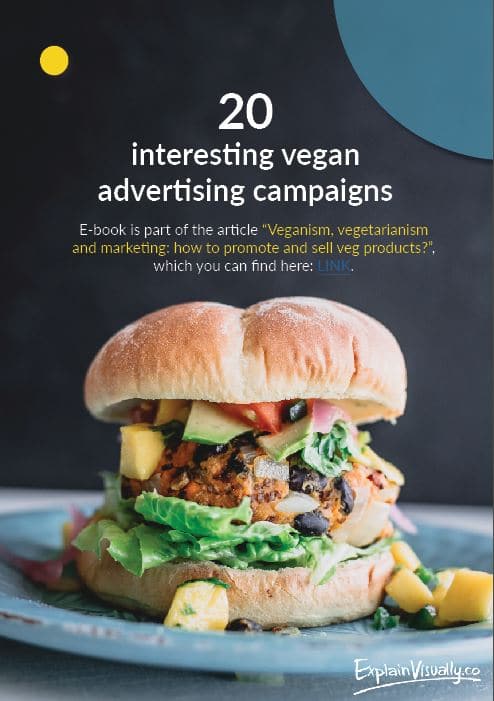
-
Why do companies like Bahlsen, Hochland and Herbalife choose our animation studio?
-
How we can help you reach your goals?

She studied Japanese and linguistics at the University of Warsaw, but it was her work for an NGO, first as a volunteer, and then professionally, that shaped her interests. As a coordinator of one of the campaigns she organized conferences, meetings at the Parliament, fashion shows, made interviews with politicians and celebrities. She also took care of social media and marketing. Now she is responsible for marketing and running social media at ExplainVisually.
Bibliography
[1] Warszawa wśród 10 najbardziej przyjaznych weganom miast na świecie: https://www.focus.pl/artykul/10-najbardziej-przyjaznych-weganom-miast-na-swiecie-wsrod-nich-warszawa
[2] O 718% od maja wzrósł kurs akcji Beyond Meat. Producent mięsa z roślin hitem inwestycyjnym na giełdzie w USA: https://strefainwestorow.pl/artykuly/gielda-usa/20190724/beyond-meat-roslinne-mieso
[3] Fake-Meat Startups Rake in Cash Amid Food Supply Worries:
[4] Fake meat products continue to attract real money: https://www.thenationalnews.com/business/fake-meat-products-continue-to-attract-real-money-1.1055372
[5] Industry ARM, Egg Substitutes Market – Forecast(2020 – 2025)
[6] Plant-Based is Booming! “Now What?” for Brands: https://www.spins.com/resources-webinar-plant-based-is-booming-brands/
[7] Errata: Raport GUS – Przeciętne spożycie mięsa na osobę spadło w Polsce o 2,24% w 2019 roku: https://roslinniejemy.org/blog/gus-przecietne-spozycie-miesa-na-osobe-spadlo-w-polsce-o-20-w-2019-roku
[8] Badanie Nielsen: Wege warte miliony: https://www.petrolnet.pl/badanie-nielsen-wege-warte-miliony/
[9] Hot dogi bez mięsa wielkim hitem: https://www.rp.pl/Przemysl-spozywczy/310279959-Hot-dogi-bez-miesa-wielkim-hitem.html
[10] Maciej Otrębski, RoślinnieJemy: zamienniki mięsa to już nie trend a segment rynku: https://www.wiadomoscihandlowe.pl/artykul/maciej-otrebski-roslinniejemy-zamienniki-miesa-to-juz-nie-trend-a-segment-rynku
[11] Greggs’ vegan sausage rolls fuel profit boom: https://www.theguardian.com/business/2019/may/14/greggs-vegan-sausage-rolls-fuel-profit-boom
[12] „Nie byłoby Plantonów bez prawie 30-letniego doświadczenia produkcji jogurtów mlecznych” – wywiad z Magdaleną Kubit: https://roslinniejemy.org/blog/nie-byloby-plantonow-bez-prawie-30-letniego-doswiadczenia-produkcji-jogurtow-mlecznych-wywiad-z-magdalena-kubit-ceo-firmy-jogurty-magda
[13] Jogurty Magda. Dobry biznes na jogurtach dla wegan: https://www.forbes.pl/biznes/jogurty-dla-wegan-polski-producent-jogurty-magda/xdmxy7w
[14] Magazyn „Vege” 3/2019
[15] Linda Bacon, Jonathan Wise, Sophie Attwood i Daniel Vennard, The Language of Sustainable Diets: A Field Study Exploring the Impact of Renaming Vegetarian Dishes on U.K. Café Menus, 2019
[16] The dos and don’ts of marketing plant-based foods: https://www.foodbusinessnews.net/articles/13280-the-dos-and-donts-of-marketing-plant-based-foods
[17] Unia Europejska zdecyduje, czy wegetariańskie burgery mogą być nazywane burgerami, skoro nie ma w nich mięsa: https://bezprawnik.pl/wegetarianskie-burgery-unia-europejska/
[18] „Mleko sojowe” i „masło roślinne” zakazane. Trybunał Sprawiedliwości na wojnie z weganami i podszywaniem się pod mięso: https://bezprawnik.pl/tsue-kontra-weganie/
[19] Wegeburger nie zostanie zakazany. Burzliwa debata o… bezmięsne parówki: https://www.msn.com/pl-pl/wiadomosci/polska/wegeburger-nie-zostanie-zakazany-burzliwa-debata-o%E2%80%A6-bezmi%C4%99sne-par%C3%B3wki/ar-BB1an00e
[20] Oatly: Another Swedish Success Story in China: https://www.marketingtochina.com/oatly-another-swedish-success-story-in-china/
[21] Polacy rezygnują z mięsa: https://archiwum.rp.pl/artykul/1413153-Polacy-rezygnuja-z-miesa.html
[22] Impossible Burger’s ‘bleeding’ ingredient gets FDA approval: https://www.fooddive.com/news/impossible-burgers-bleeding-ingredient-gets-fda-approval/528577/
[23] Vegan Oatly Exceeds Sales Targets After ‘Like Milk But Made For Humans’ Campaign: https://plantbasednews.org/lifestyle/vegan-oatly-exceeds-sales-targets-after-campaign/
[24] KFC lures flexitarians and curious vegans with Imposter burger: https://www.campaignlive.co.uk/article/kfc-lures-flexitarians-curious-vegans-imposter-burger/1587562
[25] Should Vegan Products Be Sold Alongside Meat And Dairy Items In Retail Stores? https://www.forbes.com/sites/katrinafox/2018/05/07/should-vegan-products-be-sold-alongside-meat-and-dairy-items-in-retail-stores/#40e6f1ff3204
[26] #ppp2019: Karolina Kubara – Pół roku z roślinnymi burgerami: https://www.youtube.com/watch?v=V8Kpy4cmZ4w
[27] Abel Thomas , Roshan Deshmukh , Vegan Food Market by Product Type (Dairy Alternative, Meat Substitute and others) and Distribution Channel (Offline and Online): Global Opportunity Analysis and Industry Forecast, 2019-2026; 2019
[28] W 2019 roku weganizm wszedł do mainstreamu. Jak trend będzie ewoluował w tym roku? https://www.dlahandlu.pl/detal-hurt/wiadomosci/w-2019-roku-weganizm-wszedl-do-mainstreamu-jak-trend-bedzie-ewoluowal-w-tym-roku,84565.html


